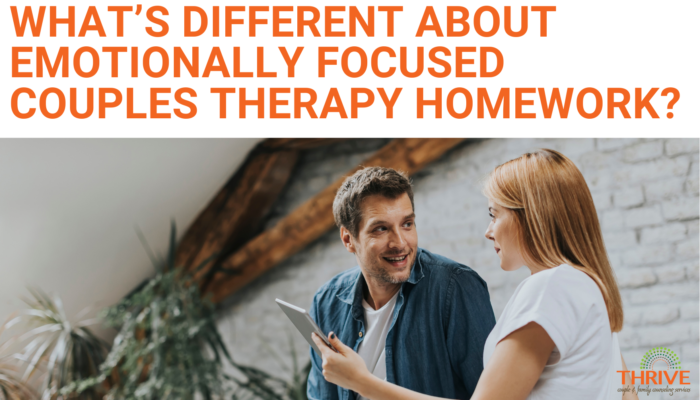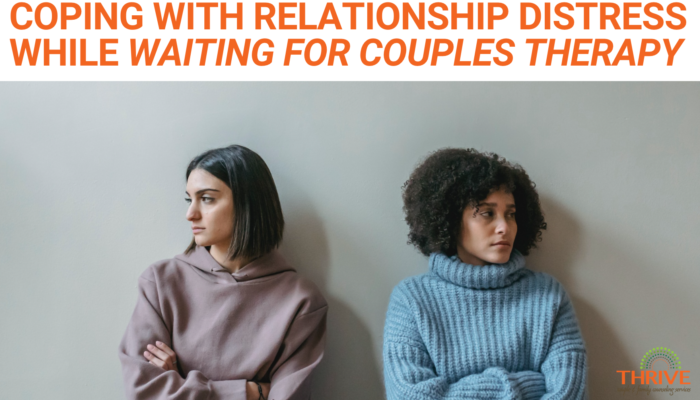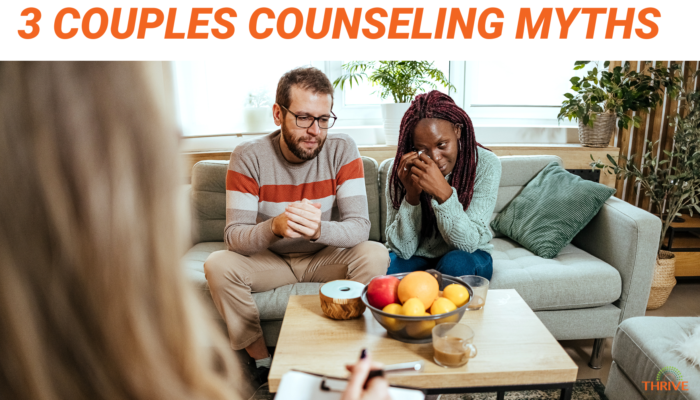The ultimate goal of couples therapy is to find new ways to communicate and relate with one another in and outside of the therapy room. The therapy room is a safe and nonjudgmental space where you and your partner can practice being vulnerable with one another, and you will get lots of support to experience a new way of relating.
But you may also wonder what you can do outside of therapy, in between your couple therapy sessions.
Emotionally Focused Couples Therapy homework can help you apply the concepts learned in therapy to your real life experiences with your partner.
Taking time to work on concepts or skills learned in therapy between sessions can make a big difference in your progress. Not only does practicing between sessions show your partner that you’re serious about committing to changing your dynamic, but it can help you use your new skills in action.
As you practice your new skills learned in Emotionally Focused Couples Therapy, you’ll learn what it feels like to respond to your partner in a more emotionally attuned way.
So what can a couple do for EFT couples therapy homework?
First, let’s start with a quick overview of EFT and how it’s different from other kinds of couple therapy.
What is Emotionally Focused Therapy?
Emotionally Focused Therapy (EFT) is a model of working with clients based on concepts from Attachment Theory. Attachment Theory states that humans are wired for connection our whole lives – it’s a matter of survival for us to form attachments to our loved ones.
As long as our basic physical needs are being met, this need and longing to connect drives our behavior in many of our daily interactions.
In other words, behind every connected moment, argument, or reaction, you can safely predict there’s an attachment need shaping our behavior and reactions.
In addition, Attachment Theory explains how the way we learn to attach to our caregivers can shape the way we feel and respond in adult relationships.
Psychologists John Bowlby and Mary Ainsworth developed attachment theory, and based on their research identified four attachment styles that people tend to develop: secure, anxious, avoidant, and disorganized.
How does Emotionally Focused Therapy help couples?
Though it shares commonalities with other therapy disciplines, Emotionally Focused Couples Therapy is unique in several ways.
In EFT, we work with clients to better help them understand how their attachment longings and feelings affect their reactions. Sometimes, that inner process is not in our conscious awareness at first.
When you don’t understand what you or your partner are feeling deep inside, your responses and the way you reach to each other can be missed altogether, misinterpreted, or unclear. This can result in you or your partner becoming more upset, and/or more escalation, which then shapes your partner’s experience of you. They respond by coping with whatever gets stirred up for them.
Often, couples get stuck in this repeating pattern and it can create further disconnection and distress.
Every couple has a negative cycle they experience. It’s part of being in relationships with other humans. We all have insecurities and personal experiences that inform the way we respond, and we also can’t read minds. It can be hard to communicate your needs in relationships
EFT prioritizes emotion and emotional regulation as one of the key elements of clients’ experiences and the key to strengthening relationship interactions.
What this means is that your feelings are an important part of the process.
Also, in EFT, we know from research that learning communication skills in an intellectual way doesn’t stick for couples in the heat of the moment when you’re upset.
For example, when was the last time you got upset with your partner and remembered to use “I Statements,” reflect back what your partner said to make sure you heard it right, paused and took five deep breaths before you tried to state your feelings, etc.? If you find it hard to do those things when you’re upset, you are VERY NORMAL.
That’s why in EFT we help couples using what the research tells us works: in the moment slowing down, organization and making sense of what is happening in the room, and lots of practice at accessing and sharing deeper feelings that are underneath what you’re trying to communicate.
Why do we need couples therapy in the first place?
Frequently when couples seek therapy they are usually very stuck in a negative pattern.
They are acutely aware of their feelings of anger, frustration, and lack of connection. We call those more obvious emotions Secondary Emotions. You are typically aware of your own, and you are very likely aware of your partner’s Secondary Emotions. However, this is only one part of a larger puzzle.
In every relationship puzzle, each partner has their own more vulnerable emotional puzzle pieces.
These vulnerable emotions are called Primary Emotions. They are often under the surface and harder to identify both for the person feeling it, and definitely harder for their partner to spot.
Examples of Primary Emotions include sadness, grief, and almost every relationship fear.
Attachment Fears include Fear of:
- Abandonment
- Not Being Good Enough
- Rejection
- Not Being Able to Count on Someone
Since we’ve all been developing our attachment style since childhood, it can seem like it’s unchangeable. That’s not the case, however. At the root of our attachment style are our attachment needs, or what we need to feel secure, safe and connected to our caregivers.
Attachment needs are things like:
- To know I matter
- To know I am loved
- To know that I am not a burden
- To know that I won’t be abandoned or rejected
- To feel accepted
We all have attachment needs, but we don’t always have to respond to them the way we’re used to. it is possible to change the way you deal with your attachment needs.
Because the need for secure attachment is universal and a primary goal behind our human behavior, all of these emotions are part of our survival strategies and serve a purpose.
Once clients begin to understand their feelings as messengers instead of facts, change can be invited into the therapy room.
What will we learn in Emotionally Focused Therapy sessions?
A key pillar of EFT Couples Therapy is developing an awareness of the negative cycle in your relationship. We all get stuck from time to time, and every relationship will have ups and downs.
Learning how to notice when the negative cycle is interfering with the way you relate to your partner will help you move toward fixing it. EFT can help you and your partner understand what your cues or triggers are for entering into the negative cycle.
You can also explore how each trigger fuels thoughts, beliefs, and feelings that you both have about yourself, your partner, and your relationship.
Another big part of Emotionally Focused Therapy is learning how to slow down before responding to give yourself a chance to identify, understand and share your emotions.
This slowing down also creates the space needed to understand your partner’s experience too.
Often when we react too quickly, we miss the really important messages of vulnerability and longing in each other. Reactivity makes things worse because it increases your feelings of disconnection and fear and pushes you further apart.
Emotionally Focused Therapy helps clients learn new ways to communicate feelings and respond to unmet attachment needs in ways that foster connection and intimacy.
Lastly, EFT teaches you how to connect with your deeper attachment needs and then share those needs safely with your partner. Communicating your attachment needs is vulnerable, and it can feel scary or overwhelming sometimes to share them with your partner, even one that you trust and love. EFT therapists are specialists in supporting you to lean on each other in this vulnerable new way of reaching to one another that meets your universal attachment needs.
What kinds of therapy homework can we do in between Emotionally Focused Couples Therapy sessions?
Therapy isn’t like school, where assignments are required and you get a letter grade. Sometimes, therapists will assign homework to help you practice the concepts you worked on in session or to reflect on certain topics more deeply.
If you imagine couples therapy homework, perhaps you picture things like:
- Practicing “I statements”
- Repeating back what your partner says so they know you understood them
- Taking turns talking
As mentioned, research shows that while skills-based learning about relationships can’t hurt a couple, the truth is we just don’t tend to use skills like these when we are upset with our partner. We tend to react in predictable ways, that then triggers our partner who responds in their predictable ways.
It makes sense though, when you are struggling that you would want or even need something to focus on in between meeting with your therapist.
The momentum of learning new things in the therapy room can make it even more tempting to continue working on what you’ve learned and practice more than just once a week during couples therapy.
What does therapy homework in EFT look like?
Unlike other therapy modalities, Emotionally Focused Therapy is experiential. EFT helps couples access deeper experiences that cause distress and practice responding in a new way. A way to continue this experiential learning is to practice your new skills when you’re not in therapy.
Homework that a clinician might assign in EFT will look different than other types of therapy. Here are some examples of “couples therapy homework,” EFT-style.
Check in with body sensations
It’s important to notice the sensations you’re feeling in your body when you’re feeling distressed. This can give you both more information about what’s going on and help you recognize when you’re getting to the point of distress before things get out of hand.
Homework from an Emotionally Focused Couples Therapist may include asking clients to be more aware of physical sensations in their body during moments of distress with their partner. Awareness of what’s going on is a crucial step to making positive changes in your relationship.
Consider your role in the negative cycle
Each partner has a role to play in the negative cycle. Acknowledging your role in the negative cycle doesn’t make you a bad person, it makes you a human. It’s helpful to learn to identify what’s happening on your side of the negative cycle rather than solely focusing on thoughts or actions of your partner.
An EFT therapy homework assignment may ask each of you to explore your side of the negative cycle to help gain more understanding of what’s going on.
Learn more about your negative cycle
Once you’ve familiarized yourself with your side of the negative cycle, you can broaden your focus back to your partner. Understanding their side of the negative cycle can help you relate to them in a more empathetic way. It can also be helpful to remind yourselves that you’re a team, and that it’s the two of you against the problem, not the two of you against each other.
Your therapist may assign you homework to learn more about each other’s roles within the negative cycle.
Cultivate awareness
Once you understand how you and your partner show up in your negative cycle, you can respond with more compassion. It’s hard to stay frustrated at someone when you know the core reasons behind their behavior.
When you can take a step back and observe the cycle as it’s happening, and notice it instead of getting dragged into it, it will feel less like the cycle is controlling your relationship. It is helpful to invite couples to pay attention to when they feel caught in their negative cycle, and recognize what they tend to do; pursue their partner, withdraw from their partner, or a combination of the two.
Working with an Emotionally Focused Couples Therapist can help you and your partner learn more about your negative cycle and give you personalized therapy homework so you can continue to connect with one another outside of your couples therapy sessions.
Get in touch with our Centennial counseling office today to set up an appointment.





